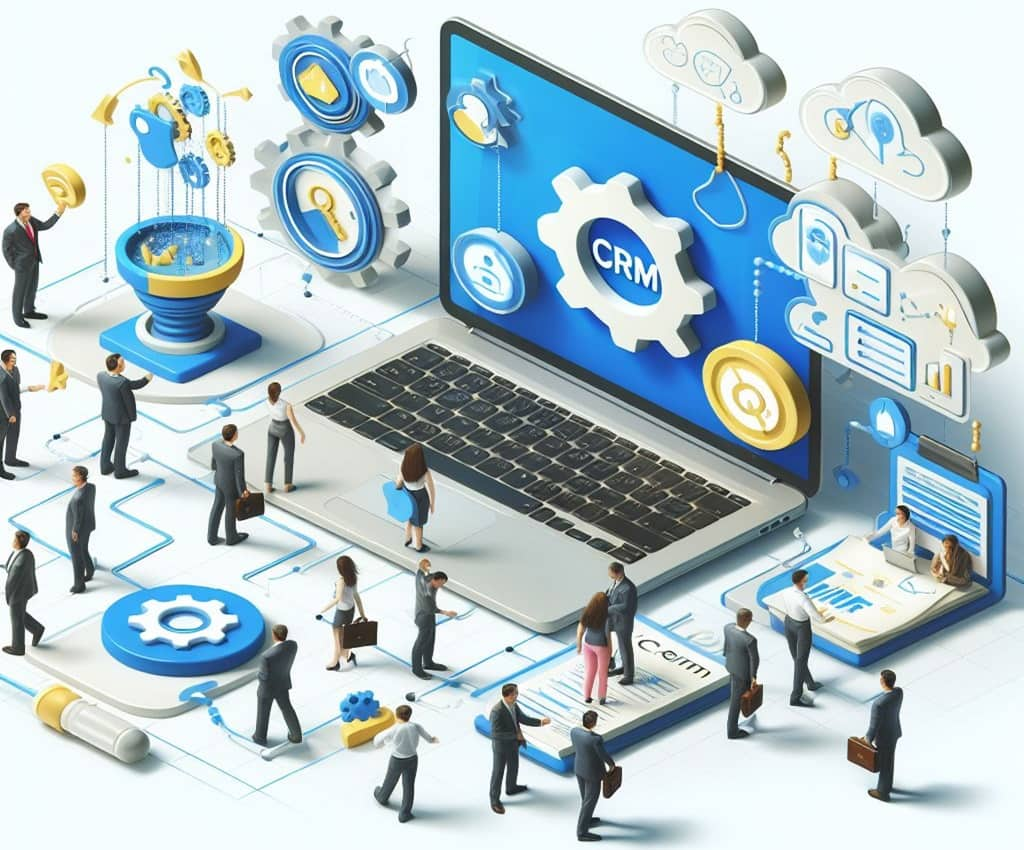Customer Relationship Management (CRM) automation and computing is an important tool for businesses to manage their customer interactions effectively. It allows companies to gather data, analyze it, and make informed decisions about their customers, leading to improved customer satisfaction and loyalty. However, with the increasing use of technology in business operations, security concerns have become a major issue for organizations.
What is CRM Automation?
CRM automation refers to the use of software and technology to automate the process of customer relationship management. This includes automating tasks such as data collection, analysis, and communication with customers. With CRM automation, businesses can streamline their processes, save time and resources, and improve overall efficiency.
Behind the Combination of CRM and Computing
The combination of CRM and computing has revolutionized how businesses interact with their customers. With the use of computing technology, companies can gather and store vast amounts of customer data, which can then be used to analyze customer behavior and preferences.
This information is crucial for businesses to tailor their marketing strategies, improve product offerings, and provide personalized customer experiences. However, with the increasing reliance on technology, businesses are exposed to potential security threats.
Security Risks Associated with CRM Automation
With customer data sensitive being put together and processed on the automated CRM systems, there is a likely chance for this data to leak to an unauthorized person. In the world of cyber-security, breaches like hacking, phishing, and malicious software could end up in the violation of customer information which in consequence causes the customers financial damages and tarnishes the firm’s image. On the other hand, cloud-based CRM systems, which are on the rise so fast, endanger businesses with the risk of third-party service providers’ data breaches as well.
Importance of Security in CRM Automation
With the increasing number of businesses relying on CRM automation for the optimization of their daily workflow, the question of cyber security protection during this process becomes key. Here are some of the reasons why security is essential in CRM automation:
Here are some of the reasons why security is essential in CRM automation:
Protects sensitive customer data
CRM systems hold a huge amount of data on customers, which can range from their personal details to whether they have bought items or not, to the information on what the items contain. Encryption and hiding this information will help to avoid privacy invasions and ensure that information doesn’t end up with undesirable parties.
Ensures compliance with regulations
Often, the regulation of industries comes with the rules that organizations need to follow for handling the data of their clients. Not adhering to these regulations attracts hefty fines and this could damage a company’s reputation. Through these regulations, businesses will need to install proper security measures so they will be able to adhere to the regulations.
Prevents cyber attacks
With the growth of cyber threats, companies would have data breaches and other malicious attacks happening. The security layer can be enhanced through methods like encryption, firewalls, and system updates that help prevent such attacks from happening and thus protect customer information.
Safeguards business operations
An example of a CRM system vulnerability could be when the vulnerability causes a service disruption that causes financial losses to the company and the company’s reputation is destroyed. We can successfully avoid the risks of doing business online by implementing appropriate security measures that will ensure our businesses’ smooth and uninterrupted continuity. With secure systems, it becomes easier to handle customer data and transactions without the fear of system failures or disruptions.
Builds trust with customers
Customers’ being assured that their information is secure with a company likely means that these customers are more willing to engage in transactions and foster a long-term relationship. This is how customers perceive the company as a brand of quality and dependability. Companies can garner a good reputation in the marketplace and also get more customers to retain and be satisfied when they proactively take measures that will secure customer information.
Provides legal protection
In the event of a cyber attack or data breach, companies that have implemented proper security measures can protect themselves against legal action. By demonstrating due diligence in securing customer information, they may be able to mitigate any potential liabilities in case of a breach.
Additionally, certain industries have legal requirements and regulations for protecting customer data, such as HIPAA for healthcare or PCI DSS for payment card information. Implementing appropriate security measures is not only necessary to protect customers’ privacy but also to comply with these legal regulations.
Contributes to overall business success
In today’s digital age, businesses need to prioritize cybersecurity to thrive and compete in the market. A single cyber attack or data breach can have serious consequences on a company’s reputation, finances, and overall success. By investing in secure systems and ensuring the safety of customer data, businesses can mitigate these risks and focus on their core operations without worrying about potential security threats.
Ways to Mitigate Security Risks in CRM Automation
To ensure the security of customer data in CRM automation, businesses must implement measures to mitigate potential risks. This includes:
Implementing strong password policies
One of the most frequently applied techniques for hackers, to break CRM systems, is their use of weak or easily guessed passwords. Businesses must enforce very strict password policy practices to include the use of upper case, lower case, numbers, and special characters, and demands that passwords be changed at regular intervals.
Regular data backups
If there is a security breach, having a regular backup of customer data will allow businesses to get back on their feet and focus on the day-to-day operations swiftly without the worry of losing critical business data. In addition, it allows keeping customer information secure and safe from permanent loss.
Employee training and awareness
Human error is one of the leading causes of security breaches in CRM automation systems. Businesses should provide employees with regular training on cybersecurity best practices and raise awareness about potential security threats.
Regular software updates
It is crucial to keep CRM software up-to-date with the latest security patches and updates. This helps address any known vulnerabilities in the system, reducing the risk of a successful cyber attack. Regular updates also ensure that the CRM system remains compatible with other software and devices, improving its overall functionality.
Multi-factor authentication
Implementing multi-factor authentication adds an extra layer of security to the CRM system. This means that even if a hacker manages to obtain login credentials, they would still need another form of verification such as a code sent to a registered phone number or email address to access sensitive data.
Continuous monitoring and testing
Businesses must have continuous monitoring and testing protocols in place to identify and address any security vulnerabilities in the CRM system. Regular penetration testing can help expose potential weaknesses, allowing for improvements to be made before a real cyber attack occurs.
Conclusion
In today’s technology-driven world, securing digital data is crucial for businesses. Prioritizing cybersecurity within CRM systems is non-negotiable. Essential strategies include enforcing robust password protocols, conducting regular data backups, encrypting confidential information, offering employee cybersecurity training, and consistently updating software. These actions not only safeguard customer data but also fortify customer trust, thus protecting a company’s reputation and financial health.









